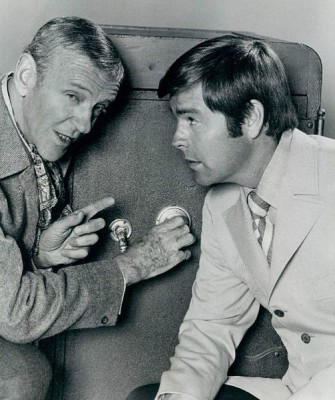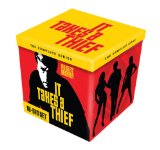| Reviews & Columns |
|
Reviews DVD TV on DVD Blu-ray 4K UHD International DVDs In Theaters Reviews by Studio Video Games Features Collector Series DVDs Easter Egg Database Interviews DVD Talk Radio Feature Articles Columns Anime Talk DVD Savant Horror DVDs The M.O.D. Squad Art House HD Talk Silent DVD
|
DVD Talk Forum |
|
|
| Resources |
|
DVD Price Search Customer Service #'s RCE Info Links |
|
Columns
|
|
|
It Takes a Thief: The Complete Series
The show was one of the last gasps of the short-lived but prolific spy craze. The huge international success of the first four James Bond movies begat a tidal wave of mostly misbegotten imitators, in movies and on TV in America and around the world. It Takes a Thief fuses elements of that genre with Mission: Impossible-type assignments and French Riviera-type glamour epitomized in Hitchcock's light thrillers, specifically To Catch a Thief (1955). In that film Cary Grant plays a retired cat burglar/jewel thief blamed for a series of high-profile robberies.
In It Takes a Thief, Wagner plays a famous cat burglar released from prison and allowed to resume his glamorous, playboy lifestyle in exchange for accepting dangerous assignments for the U.S. government. "Let me get this straight," he says, appalled, "You want me to steal?" Both titles are drawn from the same proverb: "It Takes a thief to catch a thief." Indeed, for decades I've constantly confused the names of the series and Hitchcock's film. And maybe that was the whole point.
It Takes a Thief - The Complete Series should satisfy its fans. An 18-disc set containing all 66 hour-long shows, it includes lots of extra features both on the discs and in the box, including oddball items like a four-piece coaster set. (I guess it'll go with my Looney Tunes shot glass...) Packaging states "all 66 episodes [have been] digitally remastered" but the remastering must have been a while ago. They look okay, but aren't as sparklingly good as, say, CBS/Paramount's Mission: Impossible shows, though they're miles ahead of lesser, similar items, such as the DVDs of Ironside and Cannon. More on the extras and transfers below.
Fred Astaire's (left) multiple guest-star appearances gave the series a big boost in its third year
The set-up is established in the 74-minute pilot, directed by The Outer Limits' Leslie Stevens, which in this set is called Magnificent Thief. (Its expanded, 99-minute theatrical version, for overseas, is also included; both versions were initially withheld from syndication.) Alexander Mundy (Wagner) is cooling his heels in prison when Secret Intelligence Agency (SIA) representative Noah Bain (Malachi Throne) offers Mundy a pardon - provided he'll agree to pull capers on behalf of the government and 24-7 electronic monitoring when he's not on assignment.
Another clear influence on It Takes a Thief was I Spy, the hip 1965-68 spy show series whose innovations included filming big chunks of the show on location in Asia and Europe. It Takes a Thief, however, is more a "backlot" series a la The Man from U.N.C.L.E. and Mission: Impossible, in this case a Universal production with the far-off locales faked on that studio's Universal City lot. In the third season the show actually began shooting overseas, with a bunch of episodes filmed in Italy. It got a lot better, but was abruptly cancelled and never went anywhere else.
It was also for that reason Malachi Throne eventually quit the show. According to both Throne and Wagner, the bean counters at Universal wanted to save a little money by keeping Throne on a short leash, with Bain dishing out assignments over the telephone, in scenes to be filmed on a Universal soundstage. Throne rightly felt he had earned the trip and that his contributions to the series weren't being appreciated, so he walked. Fans of the show felt the series never fully recovered, that there was something about the chemistry between Wagner and Throne never recaptured in Mundy's revolving door of new bosses, which included characters played by Edward Binns, John Russell, and Joseph Cotten.
It Takes a Thief doesn't have that cheap, sausage factory look of so many Universal TV shows from the period, but it never approaches the authenticity of To Catch a Thief or even I Spy. What seems to have attracted audiences was Wagner's suave, somewhat flippant approach. He's like an American Roger Moore-as-Simon Templar but without the breeding though more down-to-earth. The series came along at the right time for Wagner, whose juvenile lead/leading man days at 20th Century-Fox had ended and his future was anything but certain. Besides having the right look Wagner's participation (as opposed to his role) in The Pink Panther (1964) may have influenced his casting.
The show was the creation of Roland Kibbee, a writer-producer with, to say the least, an eclectic list of credits. He got his start in radio, branching out into films for A Night in Casablanca (1946), the last full-on Marx Bros. movie. But Kibbee peaked, at least in films, a few years later when he began a long association with actor Burt Lancaster, for whom he wrote the delightful The Crimson Pirate (1952) and the entertaining Vera Cruz (1954). Kibbee apparently couldn't build on that success, and instead moved into television, creating The Deputy (1959-61), a Western series that sometimes (but not always) starred Henry Fonda. From there he switched back to comedy, for the now completely forgotten first sitcom called The Bob Newhart Show in 1961, as well as the second (and least) incarnation of The Bob Cummings Show. After It Takes a Thief Kibbee became a producer while still writing here and there. He was an executive producer on two great '70s shows, Columbo and Barney Miller, and did several more Lancaster pictures, notably Valdez Is Coming (1970).
There were a lot of fingers in this pie, however, including producers Frank Price, Gene L. Coon, Jack Arnold and, in an early career assignment, Glen A. "Grand Larceny" Larson. The result was an at times slick and lighthearted but also highly derivative, comfort-food type of show. Like nearly everything from the spy series genre, It Takes a Thief seems awfully dated now, working best when it deviates from its tired genre trappings. Fred Astaire's guest appearances as Wagner's master thief father, in five third season shows, are a prime example. Moving everything to Italy (at Wagner's insistence, apparently) for about ten shows also freshens things up considerably.
Partly through Wagner's many industry connections, It Takes a Thief attracted better than usual guest stars, some of whom normally didn't do a lot of TV, while the Italian episodes feature Europeans that otherwise never did TV in America. Besides older film stars like Astaire and Bette Davis, rising young talent, including some Universal contractees, also appear, notably Susan Saint James (also in a recurring role). Wagner's future Hart to Hart co-stars, Stefanie Powers and Lionel Stander (as in that series, playing a character named Max) also appear.
Some of the more offbeat and/or memorable guest stars during It Takes a Thief's run include: Senta Berger, Ricardo Montalban, Tina Sinatra, Martine Beswick, Adolfo Celi, Bill Bixby and Paul Lukas. Directors were mostly workhorses from Universal's stable: Don Weis, Jack Arnold, Gerd Oswald, Jeannot Szwarc, Leslie Stevens, Joseph Sargent, etc.
Video & Audio
It Takes a Thief is housed in an attractive if flimsy cardboard box, the kind of thing that makes the perfect gift but which is quite impractical for regular use. For one thing, the DVDs are buried at the bottom of the box, beneath a lot of bric-a-brac outlined below. Each season gets its own color-coded, foldout sleeve, typically with four shows presented on each single-sided, dual-layered disc. The packaging is helpful here, with episode titles, airdates, and plot summaries included. The full-frame transfers are okay but not stellar. It's possible they were explicitly remastered for this set but they look more like something done in the early days of DVD, such as A&E early releases of late-'60s shows. The English mono on these sets is adequate, and I didn't notice any altered music or edited shows, though I didn't watch all 66 episodes for this review, either.
Extra Features.
The first season set includes the expanded, theatrical version of the pilot, plus two interviews. "The King of Thieves" is a half-hour extended interview with series star Robert Wagner, still handsome and looking far, far younger than his 81 years (he could pass for late fifties) and his recollections are surprisingly vivid and intimate. "A Matter of Larsony" ("Larceny" on the packaging") interviews producer Glen A. Larson, also for a half-hour segment.
The packaging includes various tchotchkes, including a limited edition senitype, a 35mm frame featuring Wagner's image; a set of four drink coasters, and, more helpfully, a full-color booklet featuring an informative essay by Dean Brierly.
Parting Thoughts
It Takes a Thief is the kind of show that either works for you or it doesn't. I found it just okay, the kind of thing that makes a decent time-killer when it's too late to start a movie but you're not quite ready to hit the hay yet, either. For Wagner's performance, his chemistry with Malachi Throne and various guest stars, It Takes a Thief is Recommended.
Stuart Galbraith IV's latest audio commentary is Godzilla vs. Megalon (with Steve Ryfle) or, as we like to call it, It Takes a Lawsuit.
|
| Popular Reviews |
| Sponsored Links |
|
|
| Sponsored Links |
|
|
| Release List | Reviews | Shop | Newsletter | Forum | DVD Giveaways | Blu-Ray | Advertise |
|
Copyright 2024 DVDTalk.com All Rights Reserved. Legal Info, Privacy Policy, Terms of Use,
Manage Preferences,
Your Privacy Choices | |||||||















